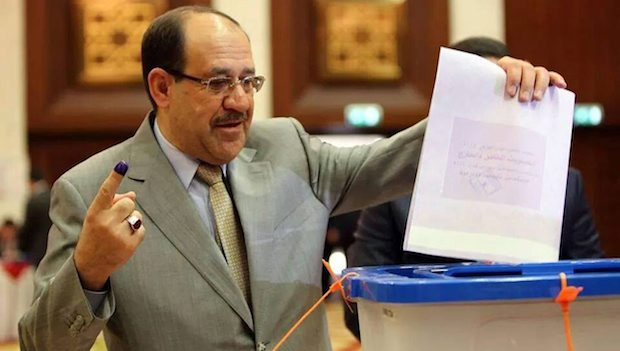Secret of al-Maleki’s Success: Power, Resistance, and Steadfastness

These days, the elections in Iraq are top news in the region and the world. One of the surprising points about this election was the leading votes of the State of Law coalition led by Noori al-Malek, an issue which disrupted the Shiite-Sunni-Kurd equations and was able to practically create a stronger position for the future of the Noori al-Maleki government. Stubbornness and power were the components which attracted the people’s attention to vote for the State of Law. At this juncture, Noori al-Maleki succeeded in winning the people’s votes based on his own abilities. This is while the religious scholars and a major part of the Shiite parties and movements had strongly protested against the performance of the State of Law and the personality of Mr. Noori al-Maleki himself. Some religious scholars in Najaf had openly stopped supporting him. Iraq’s Islamic Supreme Council and the group affiliated with Muqtada Sadr were not able to stop the government of Noori al-Maleki and the State of Law coalition either. In the end, al-Maleki achieved great success which, based on the analysis of some experts, was the result of his power, resistance, and steadfastness.
The continuation of al-Maleki’s presence in the position of prime minister can guarantee the policies of the State of Law for one more term and, thus, it is expected that the foreign policy of the Iraqi government will not experience tangible changes in the near future and the axis of Iran, Syria, Iraq, and Hezbollah will be able to act more powerfully than before and Saudi Arabia and Turkey will be more isolated in the region.
Noori al-Maleki needs a serious coalition to establish his government. It can be speculated now that his problems would be less than before and he would be able to reach tangible results with regard to his coalition with Talebani and some of the Sunni and Kurd groups. Some of Iraq’s experienced politicians believe that the presence of Mr. Maleki in the position of prime minister will be accompanied with the stability and power of the government. The continuation of Iran’s support of al-Maleki will also greatly impact his increasing power. However, it is expected that he would experience serious challenges in the domestic front with Ayad Allawi, the Islamic Supreme Council, Muqtada Sadr’s group and some Kurds and Sunnis and be confronted with the same old foreign enemies who will continue their hostility towards his government. Saudi Arabia, Turkey, and Qatar have, hitherto, created heavy barriers in his difficult path. It is predicted that this hostility will continue. The turbulent situation in the al-Anbar province, in which the involvement of Saudi Arabia is very clear based on statements made by Jordanian and Iraqi security officials, or Turkey’s attempts to instigate the Kurds against the central government by using the economic capacities and energy of the Kurdistan region are obvious reasons for this claim.
The results of the election in Iraq indicated well that Iraq’s traditional politicians were not able to strengthen their power against al-Maleki due to their affiliation with the Arab and western countries. This was while, in this election, al-Maleki was able to gain relatively surprising successes in his challenges with the supporters of the western and Arab states, among the Shiites, Allawi, the Kurds, Barzani, and the Sunnis. Many of al-Maleki’s rivals hope to gain the position of prime minister in order to obtain financial resources. Even the support of Saudi Arabia, Turkey, Qatar, the UAE, and Jordan for al-Maleki’s rivals, both in the Shiite and Kurd-Sunni fronts, was not able to reduce his power. It can be explicitly pointed out that one of the reasons behind the failure of Saudi Arabia, Turkey and Qatar in the civil war in Syria was Noori al-Maleki’s strong personality. During his tenure as prime minister, they were not able to impose their power and failed in reaching their objectives in Syria.
Noori al-Maleki’s understanding of the bitter events in the terrorist front in Syria, the status of Seyyed Hassan Nasrallah, the leader of Hezbollah, and Iran was a realistic one. On the other hand, the Shiite fronts in Iraq such as that of the Marjas, the Islamic Supreme Council, the Sadr groups, the Fazilat Party and personalities such as Chalabi and Ibrahim Jafari demand a greater share of the power.
It can clearly be seen that during his tenure as prime minister, al-Maleki was able to contain the Sunni-Kurd front and his Shiite allies and rivals, and hence show his Iraqi nationalism.
Now al-Maleki has stood in a completely superior position with regard to all of Iraq’s domestic and regional fronts and based on the relative support of the US and its strategic alliance with the governments of Iran and Syria, he will be faced with less problems than his previous term. There is no doubt that he will be able to form a stronger government with new coalitions and better control the insecurity and terrorism and advance the development and construction of the country.

